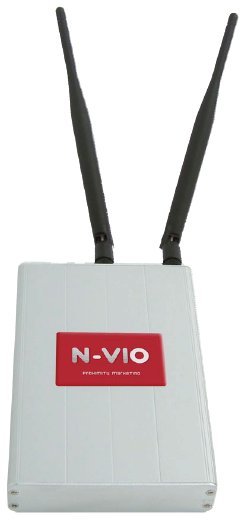Routers use Linux for proximity marketing
May 7, 2009 — by Eric Brown — from the LinuxDevices Archive — 38 views [Updated: 7:30PM] — Libelium is shipping two Linux-based WiFi and Bluetooth routers that deliver proximity marketing services. The outdoor-mountable “N-Vio” and indoors-only “N-Vio Lite” devices offer public WiFi access, as well as Bluetooth or WiFi-based interactive marketing services, says the Zaragoza… Spain-based company.
[Updated: 7:30PM] — Libelium is shipping two Linux-based WiFi and Bluetooth routers that deliver proximity marketing services. The outdoor-mountable “N-Vio” and indoors-only “N-Vio Lite” devices offer public WiFi access, as well as Bluetooth or WiFi-based interactive marketing services, says the Zaragoza… Spain-based company.
(Click for larger view of the N-Vio)
The N-Vio routers are aimed at providing retailers with proximity marketing services, allowing them to beam discounts and advertising content to mobile-device users within a 100-meter Bluetooth or 200-meter WiFi radius, says Libelium. The bundled Proximity marketing and sales campaign software is said to enable creation and configuration of marketing campaigns with multimedia content, including product demos. The software, which requires voluntary opt-in from users, lets retailers program specific days and times for campaigns, and change messages accordingly, says the company.
 N-Vio proximity marketing software (Click to enlarge) |
While the N-Vio offers three Bluetooth radios, the N-Vio Lite supplies only one. As a result, the mountable N-Vio supports up to 21 simultaneous sessions vs. seven for the Lite version, which is designed to sit on a counter-top. The Bluetooth radios are dedicated to interactive marketing. The WiFi access point can be used as an interactive marketing conduit, as well as providing Internet access to customers.
Both the N-Vio and N-Vio Lite run Debian Linux on AMD Geode processors, but the N-Vio is equipped with a 500MHz LX800, while the Lite version runs an LX700, clocked at 233MHz. The devices provide 256MB RAM (128MB for the Lite), 8GB of flash storage, and an Ethernet port.
 N-Vio Lite |
Specifications listed for the N-Vio and N-Vio Lite include:
- Processor — AMD Geode LX800 @500MHz (N-Vio) or LX700 @233MHz (N-Vio Lite)
- Memory — 256MB RAM (N-Vio); 128MB (N-Vio Lite)
- Flash storage — 8GB
- Networking — 1 x Ethernet port
- WiFi — 802.11b/g; 5dbi antenna; 200-meter range (about 219 yards)
- Bluetooth — 21 (N-Vio) or 7 (N-Vio Lite) simultaneous connections; 4 simultaneous sends; 5dbi antenna; 721Kbps; 100-meter range (about 109 yards)
- Software — Proximity marketing campaign management software included
- Mounting — Mounting for anchoring on balconies, street lamps, poles, etc. (N-Vio only)
- Temperature range — 32 to 122 deg. F (0 to 50 deg. C)
- Outdoor protection — IP65 (N-Vio only); Lite version rated only for indoor use
- N-Vio power — DC-18V; supports AC-220V, DC-12V battery or solar panel, or DC-12V car lighter using Libelium accessories; ; Power over Ethernet (PoE) option
- N-Vio Lite power — DC-18V; supports AC-220V power supply
- N-Vio dimensions — 1.2 x 6.9 x 2.0 inches (210 x 175 x 50mm)
- N-Vio Lite dimensions — 6.4 x 4.4 x 1.2 inches (163 x 112 x 30mm)
- Operating system — Debian Linux
A year ago, Libelium announced an Debian- and x86-based multi-protocol mesh router with a Debian GNU/Linux-based OS and a user-extensible browser-based open source management interface. The modular “Meshlium” router targets ultra-long-range Zigbee-based sensor networks, fleet tracking with least-cost GPRS/WiFi routing, and multiprotocol WiFi/Bluetooth hotspots.
Libelium also hosts a contest for developers using the open source Arduino microcontroller. Winners of the Arduino Open Hardware Contest have included a security system, a modular robot, and a sweater-clad haptic navigational device.
Availability
Libelium did not offer pricing information on the N-Vio and N-Vio lite, both of which appear to be shipping now. More information may be found here.
This article was originally published on LinuxDevices.com and has been donated to the open source community by QuinStreet Inc. Please visit LinuxToday.com for up-to-date news and articles about Linux and open source.